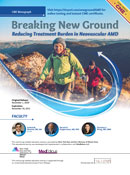An analysis of almost 200,000 patients undergoing treatment with anti-VEGF drugs for neovascular age-related macular degeneration is the largest study to date of why some don’t come back for injections and potentially the first to identify risk factors for what’s known as loss to follow-up.1
Raul Khurana, MD, of Northern California Retina Vitreous Associates in Mountain View, presented the study at the American Academy of Ophthalmology Retina Subspecialty Day.
A previous study found that loss to follow-up (LTFU) rates were 22 percent.2 “That’s very alarming and that’s why we did the analysis,” Dr. Khurana tells Retina Specialist.
“What was interesting is, we did find risk factors for it,” Dr. Khurana says.
Study design and findings
The study used the IRIS (Intelligent Research in Sight) registry to evaluate follow-up and treatment in 553,722 patients diagnosed with nAMD from 2013 through 2015, 191,694 of whom had received anti-
VEGF treatments through 2018. LTFU was defined as not returning for a visit more than 12 months after the last intravitreal injection. Overall, 11 percent of the patients were considered loss to follow-up.
“We found things such as advancing age, as patients above the age of 75 had a higher chance of being loss to follow-up,” Dr. Khurana says. The rates rose steadily after age 76, with highest rates among patients age 90 years and older; they were three times more likely to miss appointments (overall risk 2.95, p<0.001).
“We found that patients who had unilateral disease were 2.5 times more likely to be loss to follow-up than those who had bilateral disease,” Dr. Khurana adds (p<0.001).
The study also found men were more likely to be LTFU, as were Latinos and African Americans than White patients.
“Our hope is that by identifying these patients earlier we can hopefully find a better way of having them maintain their care,” Dr. Khurana says.
Expert comment
Jason Hsu, MD, co-author of the previous study Dr. Khurana cited, notes that the rate this study found was half what his group reported.
“It makes sense given the IRIS registry is generally able to track patients if they move from one practice to another as long as the other practice is part of the registry,” Dr. Hsu says in submitted comments. “The fact that one in nine patients will get an injection and not return for a year or more emphasized the fact that we still have a long way to go to improve treatment adherence and outcomes.”
Dr. Khurana disclosed relationships with Genentech/Roche, Apellis, Chengdu Kanghong Pharmaceuticals Group, Clearside Biomedical, EyePoint Pharmaceuticals, Opthea and RegenxBio. Dr. Hsu disclosed relationships with Gyroscope Therapeutics, Iveric bio, Bausch + Lomb, OccuRx, Genentech/Roche and Aldeyra Therapeutics. RS
In BriefApellis Pharmaceuticals has submitted an amended New Drug Application (NDA) for pegcetacoplan, resulting in a delay for the drug’s Prescription Drug User Fee Act (PDUFA) action date from November 26 to February next year. Pegcetacoplan is an investigative drug to treat geographic atrophy in age-related macular degeneration. Outlook Therapeutics reports that the Food and Drug Administration has accepted its Biologics License Application for ONS-5010/ Iveric bio has submitted to the FDA the first part of its NDA for a rolling review of avacincaptad pegol (Zimura), its complement factor 5 (C5) inhibitor for the treatment of GA secondary to AMD. The drug candidate already has FDA Fast Track designation. The FDA has granted Regeneron Pharmaceuticals pediatric exclusivity for Eylea (aflibercept) that extends the period of U.S. market exclusivity an additional six months through May 17, 2024. Regeneron says the determination is based on data from two Phase III trials in retinopathy of prematurity in preterm infants. |
REFERENCES
1. Khurana RN, Li C, Lum F. Loss to follow up in patients with neovascular AMD treated with anti-VEGF therapy in the United States. Poster 337 presented at the American Academy of Ophthalmology, Retina Subspecialty Day; Chicago, IL; September 30, 2022.
2. Obeid A, Gao X, Ali FS, et al. Loss to follow-up among patients with neovascular age-related macular degeneration who received intravitreal anti-vascular endothelial growth factor injections. JAMA Ophthalmol. 2018;136:1251–1259.



